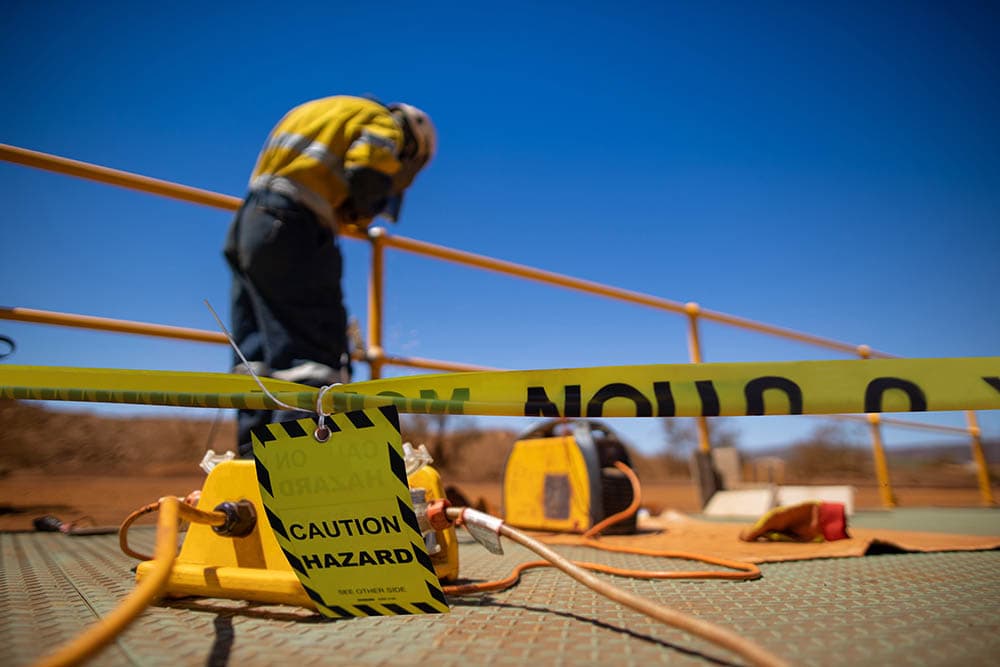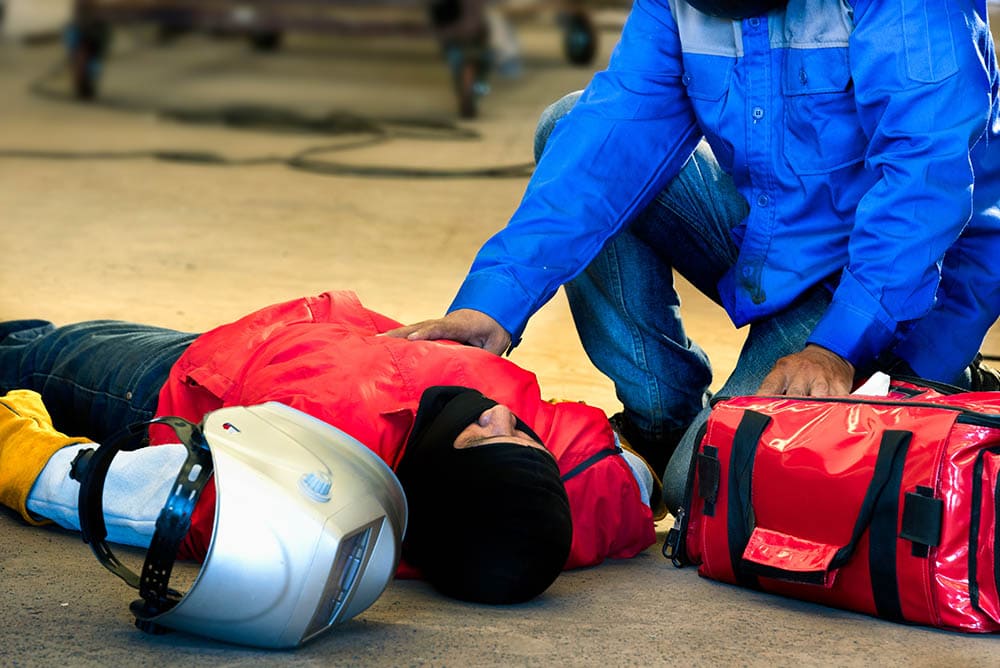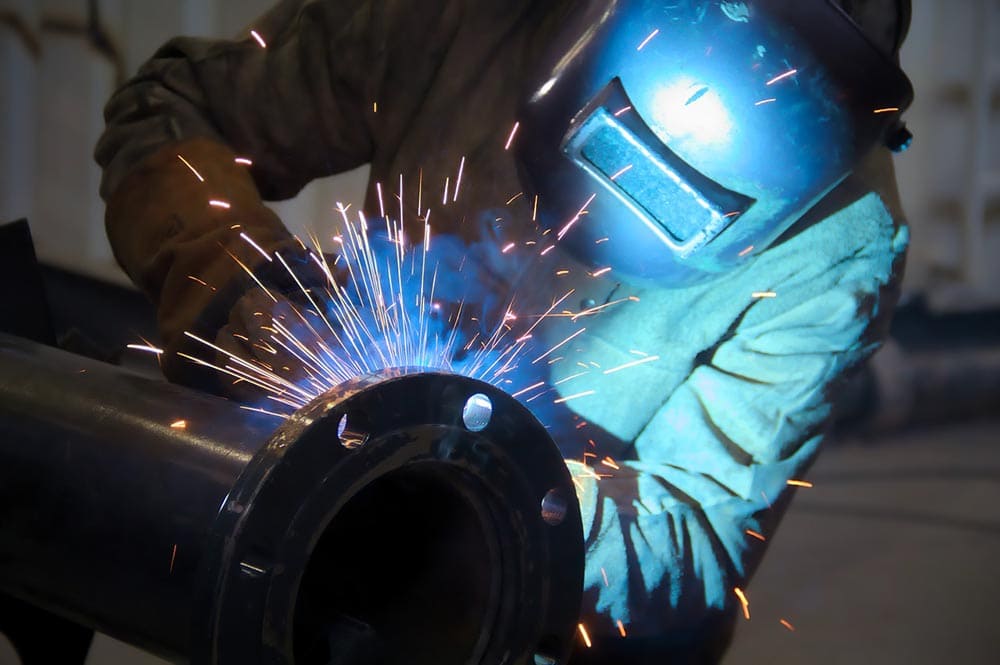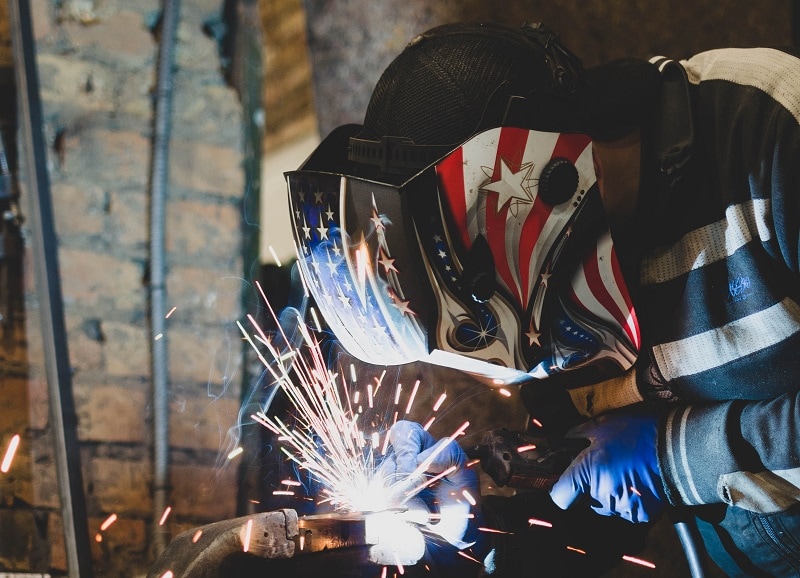How Dangerous is Welding? Hazards & Things to Know
Last Updated on

Whether you’ve been welding for years or are just starting, the big question is, “have you ever wondered how dangerous it is?” Well, it seems the risk of injury or fatality can vary depending on many factors. So, what should you know about welding hazards?
Welding has been around for a long time and has been used for various applications. But, even with proper training and awareness of possible hazards, some welders do report injuries. Besides, some of them are fatal.
In this guide, we’ll discuss how dangerous welding is.
Is Welding Dangerous?
Yes, welding can be risky. But, it depends on the type of welding you’re doing. If you’re trying to complete your first project or teaching someone how to weld, then it isn’t that dangerous.
But, if you’re using power tools to blast away hot metal without paying attention to the safety measures, then yes, it can be dangerous. You must follow the safety measures put in place by worldwide organizations such as the American Welding Society.

Can Welding Accidents Lead to Death?
Welders face many potential dangers that may lead to severe injuries. These injuries can lead to fatalities. But, if you take proper safety precautions during welding, you can reduce accidents that could lead to injuries.
We’ve discussed what you can do when faced by any welding hazard and ensure you’re safe as you carry out your welding duties.
Welding Hazards and How to Prevent Them
There’s more to welding than meets the eye. Welding involves the manipulation of extreme temperatures. It can be harmful if not handled well. If you’re a welder, you need to be aware of the many hazards that may result from this process and how to prevent them.
Here are some of the welding hazards and what you can do to prevent them from happening.
1. Electrical Hazards
Electrical risks are among the most common in any industry, especially in welding. When working with electricity, there’s always a possibility of shock or getting electrocuted.
Some precautions to take when working with electrical appliances in welding include the use of rubber gloves and safety glasses to prevent you from getting burnt or suffering an electric shock.
Let’s look at some of the electrical hazards and what you can do to prevent them.
- Unsuitable Personal Protective Equipment (PPE)
One crucial rule is to make sure you’re wearing the right equipment. Personal Protective Equipment (PPE) protects you from workplace hazards. PPE can be as simple as glasses for your eyes or a hard hat for your head.
You need hard hats to protect your head from falling objects. You wear gloves to protect your hands from sharp objects.
Welding or cutting can expose you to electrical hazards, such as arc flash. Wear leather or rubber overalls and rubber sleeves on your arms. They protect you from electrical hazards. The rubber sleeves insulate you from electrical shocks.

- Improperly Wired Welding Appliances
Common welding hazards are faulty wiring and inadequate grounding. Poorly grounded equipment may supply dangerous electrical currents and arc to welders.
Electrical wiring defects don’t cause serious welding accidents. But, improper wiring could seriously injure or kill a welder who touches a live wire.
Most welding operations involve using an electrical power source. It can either be an arc welding machine or an electric arc welding process. You must connect the welding wire and the electrode to an electrical power source through insulated welding cables.
If a wire is broken, frayed, or has loose insulation or is overheating, it can cause arcing. It’s an electrical discharge that occurs when a high amperage current passes through an insulated conductor.
The arcing produces high heat, sparks, and flying molten metal. It’s the most common cause of welding accidents. Arcing can occur at any point in the welding process.
Arcing causes burns, eye injuries, or severe electrical shock. When arcing occurs, be extremely careful.
Don’t touch any electrical equipment or wires that are glowing or smoking. If an arc burns you, immerse the wound in cool water immediately. See a doctor if the burn is severe.
2. Asphyxiation Risks
A welder working in a confined space can suffer from asphyxiation. Confined spaces comprise a walk-in container or a combustible atmosphere such as in a fume hood.
Asphyxiation is the death of the lung and chest wall muscles. It’s caused by inhaling poisonous gases, such as carbon monoxide and hydrogen fluoride. Carbon monoxide can build up when welding with a torch, where the oxygen is consumed.
Hydrogen fluoride (which reacts with carbon dioxide to form carbonic acid) can also build up during welding.
Also, an activated oxygen cylinder (air acetylene cylinder) can be dangerous if not used well. An oxygen cylinder that’s not vented well or has a faulty pressure relief valve can cause suffocation. It displaces the oxygen in the air.
Carbon monoxide poisoning can result from inadequate ventilation. It can also be caused by a malfunctioning carbon monoxide detector. Carbon monoxide is produced when fuel combustion is incomplete. Welding produces large amounts of fuel combustion.
How to Prevent Asphyxiation
Here are several ways you can prevent asphyxiation.
- Use adequate ventilation
- Use appropriate welding procedures
- Turn off welding when ventilation is inadequate
- Use muffling or filtering devices
- Use automatic controls for welding
- Use a respirator
- Make sure that there’s enough oxygen for welding
- Wear protective equipment
- Don’t allow workers to weld in enclosed spaces
- Use masks or shields to protect workers from harmful fumes or smoke from welding
- Use a fan or exhaust system for breathing air
3. Heat-Related Risks
Most welding injuries occur due to thermal burns or heat-related chemical reactions. Heat-related injuries may occur from direct contact with a hot object. It can also be indirect through contact with an overheated surface.
Contact with hot surfaces causes burns to the hands and face. Excessive heat can cause pain, redness, swelling of the eyes, and temporary vision loss.
Convection currents of air heated to temperatures above 600°F may burn the face, ears, and neck. Overexposure to heat from welding operations can result in hypothermia. Death may occur from hypothermia if the victim isn’t taken to a hospital within 24 hours.
How to Prevent Heat-Related Risks
The high heat associated with welding can burn flesh, damage organs, and cause other injuries. To prevent heat-related risks, follow these basic safety precautions:
- Wear gloves when handling hot metal
- Avoid contact with molten metal
- Make sure you maintain your welding machine’s operating temperature
- Keep yourself hydrated
- Use a cooling system when possible
- Take frequent breaks to cool off
- Avoid welds that are close to areas of high heat
- Wear flame-resistant clothing that protects your body from burns

4. Respiratory Risks
A welder’s exposure to certain gases and fumes is enough to cause health problems. Welding fumes contain carbon monoxide and oxides of sulfur, manganese, tungsten, and chromium. They combine to irritate the eyes, nose, and throat.
The carbon monoxide and oxides of sulfur forms a compound that irritates the lungs. The chromium compounds irritate the lungs and the mucous membranes in the mouth and throat.
Apart from causing lung irritation, sulfur oxide and manganese are respiratory irritants. Exposure to welding fumes causes skin irritation, headaches, and nausea.
How to Prevent Respiratory Risks
Many hazards arise when working with welding equipment. The threat of severe injury or death is real. According to the Occupational Safety and Health Administration statistics, there have been around 5,000 worksite fatalities related to welding since 1980. Welding causes about 50 deaths per year.
All welding shops and welding professionals must follow the American National Standards Institute (ANSI) codes and standards. These standards comprise rules and protocols you should follow when using different types of shielding gases and equipment. It reduces the risk of fire hazards and injuries to welders.
Here are some of the things you can do to prevent respiratory risks.
- Use proper breathing protection
- Use clean, dry, oxygen-free air
- Use properly-adjusted and functioning regulators
- Use clean, filtered ventilation
- Wear a dust mask with a NIOSH-approved filter
- Avoid using petrol-based products to clean or lubricate any part of the welding machine
- Avoid smoking or using tobacco
- Avoid using gasoline, kerosene, turpentine, or other flammable or explosive solvents
5. Exposure to IR and UV Radiation
Exposure to ultraviolet radiation (UV) and infrared radiation (IR) can cause skin cancer, cataracts, and eye injury.
UV and IR are invisible. But, they have damaging effects. They enter the body through the skin and eyes. The UV and IR that enter the body cause most health effects.
UV is absorbed by the skin and eyes. Then, it’s converted to heat and light energy. IR is absorbed by the skin and converted to heat. Welding creates large amounts of UV and IR.
How to Prevent Exposure to IR and UV Radiation
- Use a welding helmet that protects you from both IR and UV
- Use a face shield and a hat to protect your eyes and head
- Wear sun-block and protective goggles or glasses
Final Thoughts
Welding is a risky job that needs a lot of training of how to carry it out safely and efficiently. If you’re thinking about becoming a welder, you must understand the dangers of this field before you decide.
If you don’t take the necessary precautions, it can impact the rest of your life. We created this guide to help educate potential welders on what they face in their daily duties. This way, they’ll take precautions and prevent accidents and injuries that may occur.
Featured Image Credit: King Ropes Access, Shutterstock
